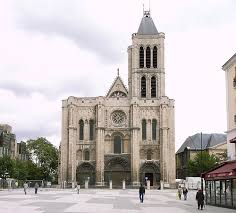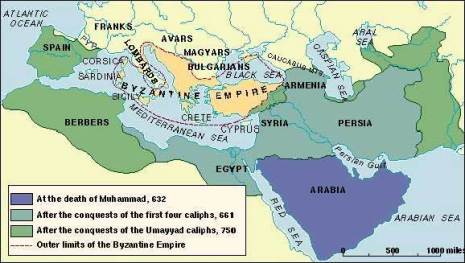 He would have said, “I told you so.”
He would have said, “I told you so.”
Since around A.D. 650 they had been spreading their special brand of religion.
They bullied and beat up the people in the Arabian peninsula. They stole what they wanted.
Then they made their way north and east to the area of Iran, “Persia” in the history books. Rape, pillage and plunder. Subjugate with the sword.
They made their way west across North Africa. Same approach. Steal, kill, abuse.
They made their way northwest up into the Iberian peninsula. We call it Spain. Same approach again. Among the conquered they found those who would join their ranks eager for a share of the spoils in the next region to conquer.
In A.D. 732 they made their way up into France toward the River Loire. They had learned of the wealth in the Christian west. They would take what they wanted there, too, they thought. The riches of the Abbey of Saint Martin of Tours were especially worth the taking.
It was all in the name of their prophet Muhammad and the religion he had made up: Islam. They were practicing their religion.
By human accounts their success should have continued. What the Muslims had already come across in Gaul (we call it France) had been easy pickings. The spoils were good. Parts of the army had split off into raiding parties to steal more of what they wished. The army continued to advance. They had horses, a cavalry. They were strong. They could even delay an attack so the horses could feed on the coming wheat harvest. The Muslims could kill and eat the livestock they stole.
But Charles Martel met them in the area of Poitiers/Tours. He was the “Mayor of the Palace,” something like a prime minister of the Franks in Gaul. He was also a military leader and his soldiers had been training for some time. He was also a Christian and he understood what was coming.
Marching south, Charles assembled his men in a phalanx formation on a high wooded plain. There he would wait and engage the Muslims in battle. Up the hill the cavalry would charge, only to be slowed and hindered by the trees. Charles and his men proved intractable. At one point a number of his men went around the battle, raiding the enemy base camp and supply train. When the cavalry drew back from battle, it found its camp in shambles. Then they fled.
Then they left Europe for a long time.
The famous historian Gibbons considered that Charles had done nothing less than save Christianity and the West at the Battle of Tours-Poitiers. Charles Martel – “The Hammer” – had achieved a monumental victory.
Even contemporary historian William Watson, who does not go as far as Gibbons, says (as Wikipedia notes):
There is clearly some justification for ranking Tours-Poitiers among the most significant events in Frankish history when one considers the result of the battle in light of the remarkable record of the successful establishment by Muslims of Islamic political and cultural dominance along the entire eastern and southern rim of the former Christian, Roman world. The rapid Muslim conquest of Palestine, Syria, Egypt and the North African coast all the way to Morocco in the seventh century resulted in the permanent imposition by force of Islamic culture onto a previously Christian and largely non-Arab base. The Visigothic kingdom fell to Muslim conquerors in a single battle at the Battle of Guadalete on the Rio Barbatein in 711, and the Hispanic Christian population took seven long centuries to regain control of the Iberian Peninsula. The Reconquista, of course, was completed in 1492, only months before Columbus received official backing for his fateful voyage across the Atlantic Ocean. Had Charles Martel suffered at Tours-Poitiers the fate of King Roderick at the Rio Barbate, it is doubtful that a “do-nothing” sovereign of the Merovingian realm could have later succeeded where his talented major domus had failed. Indeed, as Charles was the progenitor of the Carolingian line of Frankish rulers and grandfather of Charlemagne, one can even say with a degree of certainty that the subsequent history of the West would have proceeded along vastly different currents had ‘Abd ar-Rahman been victorious at Tours-Poitiers in 732.
The Muslims had spread the “religion of peace,” only it had not been so peaceful.
There had been a great deal of “islam,” but it had not been a submission to a gentle Savior who suffered for sinners. It was a surrender to brutal invading followers of Muhammad’s teaching.
There is a big difference between Islam and Christianity. Charles did the West a great service. Better to live in Europe or the Caliphates A.D.732 – A.D. 2016? It is not a hard choice to make. Law grounded in the Scriptures, or Sharia (Islamic law) from the Koran and the Hadith? Islam produced a different disposition, a different way of life.
Europe is experiencing some of it more directly now. If you have not seen the following video of migration into Europe here, you should: http://www.breitbart.com/london/2015/11/11/watch-anti-migrant-video-going-viral-across-europe/.
If you have not seen the following interactive map of migration into Europe here you should: http://www.express.co.uk/news/world/615542/Staggering-interactive-map-shows-wave-of-migrants-flocking-to-Europe-each-day.
There is not much migration going the other way.
When the Muslims attacked Paris this past November, they had already spent significant time in Saint Denis, a northern suburb of Paris. They had a “safe house” there in an apartment. When the attack on Paris came, a suicide bomber blew herself up in the area. Seven men and one woman were arrested there. https://www.washingtonpost.com/world/2-attack-suspects-in-dead-after-french-police-raid-north-of-paris/2015/11/18/a2b6d52e-8d6a-11e5-934c-a369c80822c2_story.html
Charles is buried here.

It is the Basilica of Saint-Denis.


Excellent recounting and analysis. Concise, cogent, and correct. And you weren’t even a history major. Well done, buddy.
LikeLike
I really enjoyed this article. I wish this battle was better known in modern times, as it is one of the most decisive and important engagements in military history. He who notes Gods providence will have providences to note when considering this battle and its outcomes.
LikeLike
Good stuff. Thanks, Craig. Please add Alan Handermann to your list: handera@charter.net
Thanks, Norm
On Tue, Jan 12, 2016 at 9:36 AM, The Tea Party Lawyer wrote:
> Craig Bulkeley, Th.M., J.D. posted: ” He would have said, “I told you so.” > Since around A.D. 650 they had been spreading their special brand of > religion. They bullied and beat up the people in the Arabian peninsula. > They stole what they wanted. Then they made their way north and eas” >
LikeLike